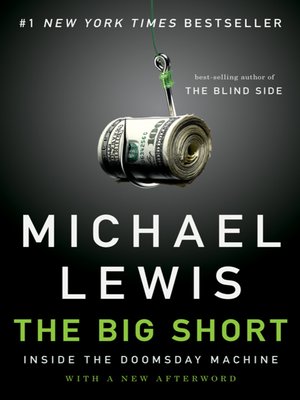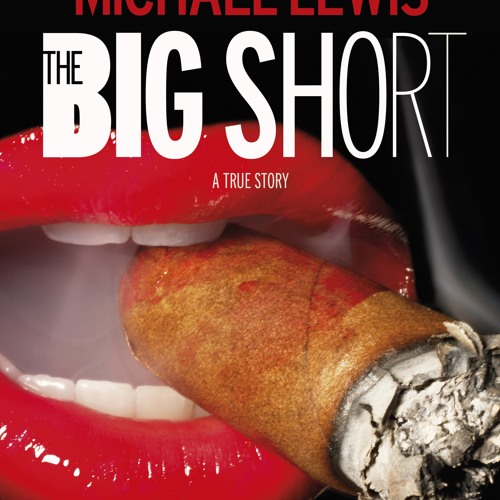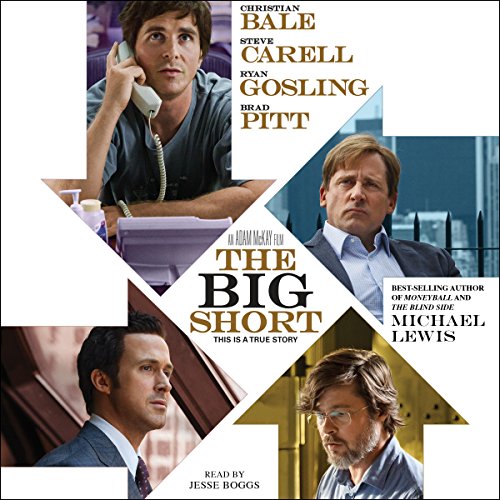Michael Lewis’s “The Big Short” audiobook is available online. It provides an in-depth look at the 2008 financial crisis.
“The Big Short” by Michael Lewis offers a riveting exploration of the 2008 financial meltdown. The audiobook version brings the story to life, detailing how a group of investors predicted and profited from the housing market collapse. Lewis’s narrative delves into the complexities of the financial world, making it accessible and engaging for listeners.
The book highlights the flaws in the system and the greed that led to the crisis. This audiobook is perfect for those interested in finance, economics, or captivating real-life stories. It combines thorough research with compelling storytelling, making it a must-listen for anyone wanting to understand the intricacies of the financial industry.

Introduction To Michael Lewis And ‘the Big Short’
Michael Lewis, a renowned author, delves into the financial crisis of 2008 in his book, “The Big Short”. Discover the gripping narrative of Wall Street’s collapse through the “The Big Short” audio book online.
Michael Lewis is a famous author known for his gripping storytelling. His book, ‘The Big Short’, is a masterpiece that uncovers the 2008 financial crisis. This book has gained immense popularity, and its audio version is a must-listen.
Early Life And Career Of Michael Lewis
Michael Lewis was born in New Orleans in 1960. He attended the prestigious Princeton University, where he studied art history. Later, he earned a master’s degree in economics from the London School of Economics.
| Year | Event |
|---|---|
| 1960 | Born in New Orleans |
| 1982 | Graduated from Princeton University |
| 1985 | Earned a master’s degree from the London School of Economics |
His early career began at Salomon Brothers, a major investment bank. There, he gained insight into the world of finance. This experience inspired his first book, ‘Liar’s Poker’.
Genesis Of ‘the Big Short’
‘The Big Short’ emerged from Lewis’s keen interest in financial markets. He wanted to explore the causes of the 2008 financial crisis.
- Michael Lewis interviewed key players in the finance world.
- He uncovered shocking truths about Wall Street.
- His findings formed the foundation of ‘The Big Short’.
Lewis crafted a compelling narrative based on real events. He highlighted the role of greed and ignorance in the crisis. The book has since become a bestseller. It was later adapted into a successful film. The audio book version offers an engaging way to experience this story. ‘The Big Short’ is not just a book; it’s a journey into the depths of financial deception.
- Explore the world of high finance.
- Understand the impact of the 2008 crisis.
- Learn from the mistakes of the past.
Michael Lewis’s storytelling makes complex topics accessible. The audio book brings his words to life in a new dimension. “`

The Heart Of ‘the Big Short’: Unveiling The Financial Crisis
Michael Lewis’s “The Big Short” takes us deep into the 2008 financial crisis. The audiobook is a thrilling exploration of the events leading to this economic disaster. Lewis reveals the hidden world of finance, making complex subjects accessible to everyone. The narrative focuses on the people who saw the crisis coming and profited from it. This section will dive into the core elements of “The Big Short,” explaining key financial concepts and the role of credit default swaps.
Key Financial Concepts Explained
Understanding “The Big Short” requires grasping some basic financial terms. Let’s break them down:
| Term | Explanation |
|---|---|
| Mortgage-backed securities (MBS) | These are investments tied to home loans bundled together. |
| Subprime mortgages | These are home loans given to people with bad credit. |
| Collateralized debt obligations (CDOs) | These are complex financial products made of bundled loans. |
These terms are essential to understanding the financial meltdown. Michael Lewis explains these concepts clearly in his audiobook. He makes sure everyone can follow the story.
The Role Of Credit Default Swaps
Credit default swaps (CDS) play a key role in “The Big Short”. They are like insurance policies for investments. Investors use CDS to protect themselves if a loan defaults.
- Credit default swaps allowed investors to bet against bad loans.
- They became popular during the housing boom.
- Many banks and investors used CDS to make huge profits.
In the audiobook, Lewis shows how these swaps contributed to the crisis. He explains how a few smart investors used CDS to foresee the collapse. They made millions by betting against the risky loans.
Michael Lewis’s “The Big Short” audiobook is a must-listen. It unveils the hidden forces behind the financial crisis. The clear explanations of financial concepts make it accessible to all.
Characters That Drive The Narrative
“The Big Short” by Michael Lewis is not just about the financial crisis. It’s about the people who saw it coming. The characters in this story are real and compelling. They drive the narrative forward. Let’s dive into the world of these fascinating individuals.
Profiles Of The Main Investors
Meet the main investors who predicted the crisis. These characters are unique and sharp.
- Michael Burry – A hedge fund manager with a keen eye. Burry saw the housing market bubble before anyone else.
- Steve Eisman – Known for his blunt personality. Eisman questioned the practices of big banks.
- Greg Lippmann – A Deutsche Bank trader. Lippmann bet against the housing market.
- Charlie Ledley and Jamie Mai – These young investors ran a small fund. They made big bets against the housing market.
Real-life Figures Vs. Literary Portrayals
The characters in “The Big Short” are based on real people. Their stories are both fact and art.
Michael Burry in real life is a quiet, intense man. In the book, his genius and social awkwardness shine through.
Steve Eisman is outspoken and critical. The book captures his fiery spirit perfectly.
Greg Lippmann is savvy and confident. His portrayal in the book shows his sharp mind and risk-taking nature.
For Charlie Ledley and Jamie Mai, their youth and daring are evident. The book illustrates their bold moves and big wins.
| Character | Real-Life Traits | Book Portrayal |
|---|---|---|
| Michael Burry | Quiet, intense, genius | Socially awkward, brilliant |
| Steve Eisman | Outspoken, critical | Fiery spirit, blunt |
| Greg Lippmann | Savvy, confident | Sharp mind, risk-taker |
| Charlie Ledley and Jamie Mai | Young, daring | Bold, successful |
These characters are the heart of “The Big Short.” Their stories make the financial crisis come alive.

Critical Reception And Impact
Michael Lewis’s audiobook, The Big Short, has captured significant attention. This section delves into its critical reception and lasting impact. We will explore how critics and financial experts responded to the audiobook. Additionally, we’ll examine its influence on financial journalism and literature.
Reviews From Critics And Financial Experts
Critics have praised The Big Short for its storytelling. They highlighted Lewis’s ability to simplify complex topics. Many reviews focused on the gripping narrative. The audiobook format received positive comments for its engaging delivery.
Financial experts also offered their insights. They found Lewis’s analysis accurate and compelling. The portrayal of the financial crisis resonated with many. Some experts noted the book’s educational value. They recommended it for those wanting to understand the 2008 crisis.
| Reviewer | Comments |
|---|---|
| New York Times | Engaging and informative |
| Financial Times | A must-listen for finance enthusiasts |
| The Guardian | Brilliantly narrated and insightful |
Influence On Financial Journalism And Literature
The Big Short had a profound impact on financial journalism. It raised the bar for investigative reporting. Journalists began to delve deeper into financial stories. The book inspired many to question the status quo.
In literature, the book set a new standard for finance-related works. Authors were motivated to make complex topics accessible. The success of The Big Short showed that finance could be engaging. This led to a surge in finance-themed books.
- In-depth investigative reporting
- Accessible financial literature
- Increased interest in finance topics
The audiobook’s impact continues to be felt. It remains a significant work in both journalism and literature.
Adapting ‘the Big Short’ For Audio
‘The Big Short’ by Michael Lewis is a captivating tale of the 2008 financial crisis. The audiobook adaptation brings this complex story to life for listeners. Converting intricate financial data into an engaging audio experience is no small feat.
Challenges In Translating Financial Data To Audio
One of the primary challenges is making complex data understandable. Financial jargon can be intimidating. The audiobook must simplify terms without losing their essence. Listeners need clear explanations to follow the story.
Another challenge is maintaining listener engagement. Reading charts and graphs in a book is one thing. Explaining them in audio requires creativity. The narrator must use vivid language to paint a mental picture.
Here are some techniques used to overcome these challenges:
- Breaking down complex concepts into bite-sized pieces
- Using analogies to explain financial terms
- Employing a conversational tone to keep the narrative lively
Narrative Techniques In The Audiobook
The audiobook employs several narrative techniques to captivate listeners. One effective method is the use of multiple narrators. This adds variety and keeps the content fresh. Each narrator brings a unique perspective to the story.
Another technique is the use of storytelling. The audiobook frames financial data within compelling stories. This makes the information more relatable and less daunting.
Here are some narrative techniques used:
- Character-driven narratives to humanize the financial crisis
- Dialogue to break up dense information
- Sound effects to enhance the listening experience
These techniques ensure that the audiobook is not just informative but also entertaining.
Behind The Scenes: Making Of The Audiobook
Creating an audiobook is an intricate process. “The Big Short” by Michael Lewis is no exception. From selecting the right narrator to the final production, each step is crucial. Let’s dive into how this captivating audiobook came to life.
Selection Of The Narrator
The narrator’s voice can make or break an audiobook. For “The Big Short,” the team wanted a voice that could capture the essence of Michael Lewis’s writing. They sought someone with a clear, engaging, and authoritative voice. The chosen narrator had to bring the characters and the complex financial concepts to life. After a thorough selection process, they found the perfect match.
| Criteria | Importance |
|---|---|
| Voice Clarity | High |
| Engagement | High |
| Authority | Medium |
Production Process Insights
The production process of an audiobook involves several stages. It starts with the recording sessions. The narrator records the entire book in a soundproof studio. This ensures high audio quality. The recording is then edited to remove any mistakes or unwanted noises.
- Recording in a soundproof studio
- Editing for mistakes and noises
- Adding background music or sound effects
Next, the team adds background music or sound effects. This enhances the listening experience. The final step is mixing and mastering the audio. This ensures that the sound quality is consistent throughout the audiobook.
- Recording
- Editing
- Mixing and Mastering
Each stage is crucial. The team works tirelessly to produce a high-quality audiobook. The end result is an engaging and immersive experience for listeners.
Learning From ‘the Big Short’
Michael Lewis’s ‘The Big Short’ is more than a story. It’s a masterclass on financial markets. The audiobook brings the 2008 financial crisis to life. Let’s explore the lessons it offers.
Lessons On Financial Literacy
‘The Big Short’ teaches important financial concepts. Listeners learn about subprime mortgages and credit default swaps. These terms become clear and relatable. Understanding these concepts is crucial for financial literacy.
The audiobook explains how banks took risks. It shows how complex financial products can lead to disaster. Listeners gain insights into the workings of Wall Street. They learn about the risks and rewards of investing.
| Term | Definition |
|---|---|
| Subprime Mortgage | A loan given to borrowers with poor credit history |
| Credit Default Swap | A financial swap agreement that the seller will compensate the buyer in the event of a loan default |
Insights Into Human Nature And Market Dynamics
‘The Big Short’ reveals human behavior in finance. It shows how greed and fear drive markets. People make decisions based on emotions, not logic. This leads to bubbles and crashes.
The audiobook highlights the role of incentives. It shows how incentives can lead to risky behavior. For example, mortgage brokers earned bonuses for selling subprime loans. This encouraged them to sell more, regardless of the risk.
- Greed and Fear: Key drivers of market behavior
- Incentives: Can lead to risky decisions
Understanding these dynamics is crucial. It helps listeners make better financial decisions. They learn to recognize patterns and avoid pitfalls.
Beyond The Book: ‘the Big Short’s Legacy
Michael Lewis’s audiobook, ‘The Big Short’, dives deep into the 2008 financial crisis. The story captivated listeners with its vivid storytelling and rich details. But the impact of this work extends far beyond its pages. Let’s explore how ‘The Big Short’ has influenced policy, regulation, and remains relevant in today’s financial world.
Influence On Policy And Regulation
‘The Big Short’ brought attention to the flaws in the financial system. It highlighted the need for stricter regulations. In response, new policies were introduced to prevent similar crises.
One significant change was the Dodd-Frank Act. This law aimed to increase transparency in the financial industry. It introduced stricter oversight and new rules for banks and financial institutions.
Another crucial change was the establishment of the Consumer Financial Protection Bureau (CFPB). The CFPB aims to protect consumers from unfair practices. These changes were a direct response to the issues highlighted in ‘The Big Short’.
Continuing Relevance In Today’s Financial World
Even today, ‘The Big Short’ remains relevant. It serves as a cautionary tale for investors and regulators. The book’s lessons are still applicable to modern financial markets.
Many experts use the insights from ‘The Big Short’ to analyze current economic trends. The audiobook helps people understand complex financial instruments like mortgage-backed securities and credit default swaps.
Listeners of the audiobook can grasp the importance of financial literacy. This knowledge empowers them to make informed decisions and avoid past mistakes.
Conclusion
Michael Lewis’s “The Big Short” audiobook offers a compelling dive into the 2008 financial crisis. It’s informative and engaging, making complex finance accessible. Listening to this audiobook online allows for an immersive experience. For finance enthusiasts and curious minds, it’s a must-listen.
Discover the intricacies of Wall Street from the comfort of your home.



